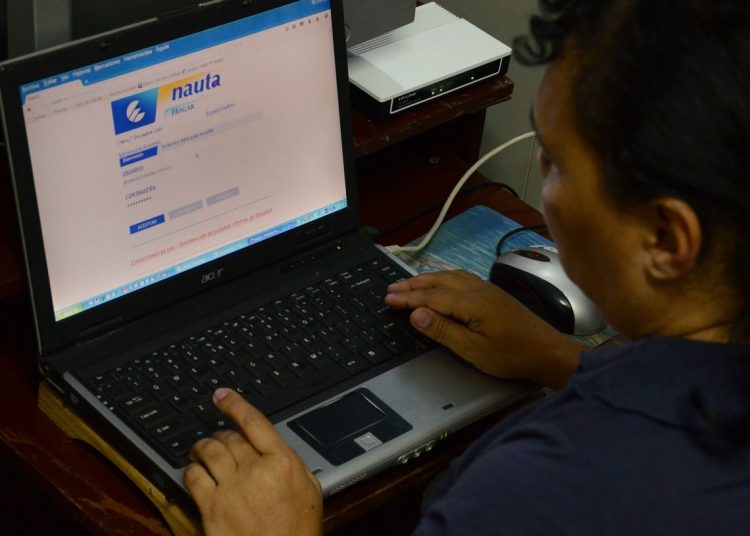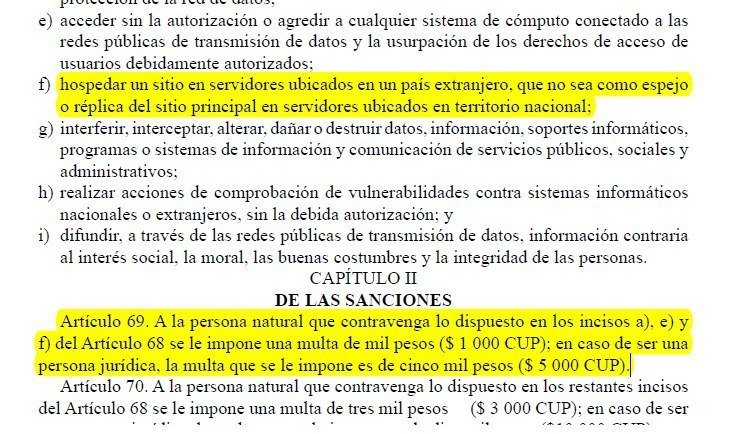If a Cuban citizen residing in the country decides to open a blog on WordPress, Medium or any other free Internet service, he/she could be fined up to 1,000 pesos (CUP), around 40 USD, according to the exchange rate for individuals. This is what articles 68 and 69 of the new Decree-Law 370 of 2018 say for the computerization of Cuban society. The decree, approved by the Council of State without going through the National Assembly, states that “hosting a site on servers located in a foreign country, which is not like a mirror or replica of the main site on servers located in national territory,” is a violation.
In conversations with two public officials of the Ministry of Communications, through the telephone number that appears on their website, both confirmed that the resolution applies to individuals. “If I have a blog on WordPress and I don’t want to put it on a national server, will I be fined?” we asked. “It is a violation and can be fined if it is detected,” they replied.
In Cuba there is only one blog hosting service, the Reflejos platform, organized by the Computer and Electronics Youth Club, which explicitly censors content for “denigrating the work of the Revolution in any sphere, its leaders, the government and the state, the work of the Communist Party of Cuba, the UJC and the mass organizations, the Revolutionary Armed Forces, MININT and the mass media.” This means that any criticism of the mentioned institutions can be considered a violation of the conditions for the use of the service and the blog can be canceled.
This was the case in February 2016 with the Arcoiris Project’s page. Arcoiris, which was created in 2011 to share information on sexual diversity and other related topics, published a text that called attention to human rights violations committed in the Military Support Units for Production (UMAP). “Fifty years have passed since the creation of the UMAP and not a single responsible person has apologized to the people,” said the text that caused the closure of the blog. Previously, other blogs such as Bubusopía, Observatorio Crítico and La Jugada had been closed.
In April 2019, the Cuban Telecommunications Company (ETECSA) announced a new website hosting service for individuals. The options, which are all paid, include monthly package fees and a single installation fee. Depending on the type of sites, prices could range between 3 CUC and 55 CUC per month. A 3 CUC per month site would have only 60 MB of website information storage and 40 MB for database. Just the Gazette with the resolution weighs almost 1 MB. The personal site could accommodate approximately 60 Gazettes. An international service such as Digital Ocean, for example, charges 5 dollars per month for 25 GB.
In the websites’ hosting technical requirements, ETECSA highlights that “except for messaging, the realization of data exchange gateways and other similar ones that facilitate the exit to other services located outside the server where the site is hosted, that imply their interaction with other systems and applications external to the service, will be disabled.” This means that if you wanted to insert a YouTube video or a tweet inside your website, you couldn’t do it. In addition, ETECSA notes that “you cannot host publications that are media,” which further corners the non-state media present in the country.
Article 71 of the Decree-Law adds that in addition to the fine, “the means and equipment used” by those responsible for the contraventions could be confiscated and would pass on, according to Article 74, “to the domain of the Ministry of Communications.” According to this law, hundreds of Cuban bloggers who today host their sites on servers such as WordPress could be fined or even lose their computers and phones.
“The inspectors appointed by the Ministry of Communications and by the local administrations of People’s Power” will be in charge of the compliance of this arbitrary measure. They would also propose and assist “in the application of the confiscation, once approved by the authority designated by the Ministry of Communications.” The new cyber policies would be empowered, in addition, “to carry out the retention of the objects subject to confiscation.”
This text was originally published in El Toque and is reproduced with the media’s authorization.
Hours later, a tweet by the Ministry of Communications of Cuba clarified that subsection f «does not refer to blogs, personal or informative websites».











